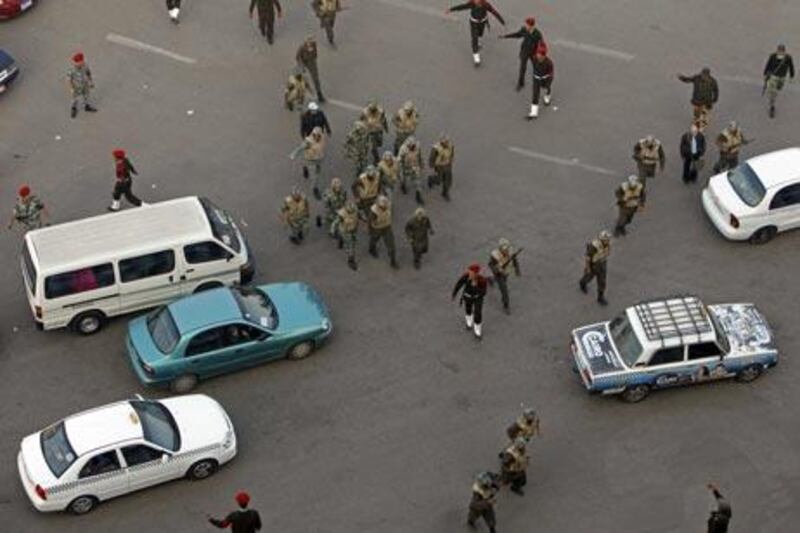• More on the situation in Egypt
CAIRO // A respected former judge who has criticised secular government will lead the effort to amend Egypt's constitution and end military rule within six months, the heads of the armed forces announced yesterday.
The appointment of Tarek el Bishry, who has urged a greater role for Islam in Egyptian society, was criticised by some liberal secularists and Christian leaders. It highlights the tug of war taking place to shape the character of the new Egypt after the resignation of the former president, Hosni Mubarak.
Mr el Bishry's appointment to head the eight-member committee on constitutional reform came on the same day that the Muslim Brotherhood, the banned Islamist organisation, announced it would apply to become a formal political party and said one of its senior members had also been appointed to the committee.
The committee will recommend amendments to Egypt's constitution, which was suspended by the military on Sunday. It has 10 days to complete its work, the military said. It did not offer details on how or if the committee's recommendations would be adopted.
The committee, made up of judges and legal experts, is expected to focus on revising articles in the constitution governing the nomination of presidential candidates and the election process. The scope of its work has not yet been defined.
The former constitution put tremendous powers in the hands of Mr Mubarak and allowed his party to dominate the election process.
Liberal activists said they were worried by Mr el Bishry's previous writings urging a larger role for Islam in a society that is roughly 10 per cent Christian and includes many non-religious citizens.
Magdy Abdulhamid, a democracy advocate who leads the non-governmental Egyptian Association for Community Participation Enhancement, said: "Tarek el Bishry is an Islamist figure, and this will have an impact on the nature of the coming constitution.
"As long they stick only to the amendments of the six election and nomination articles, this doesn't raise much fear. The fear is about a committee that reconfigures the whole constitution."
Mr el Bishry's new role and the additional appointment to the committee of Sobhi Saleh, an influential lawyer from the Brotherhood, raised "concerns", but the committee was unlikely to take up the question of the religious character of the state in its short tenure, said Bahey el Din Hassan, the general director of the Cairo Institute for Human Rights Studies.
"It is well known that Mr el Bishry is pro-political Islam and pro-Muslim Brotherhood and this would definitely colour the conclusions and the recommendations of this committee," he said.
"There is up till now no concrete detail about which articles this committee has been asked to amend."
Mr el Bishry is best known as a strong advocate for the independence of Egypt's judiciary but he has also written and spoken on several occasions of his own growing distaste for secularist principles.
In a 2007 interview with the Islamist website hadielislam.com, he spoke of how a democracy should reflect the religious character of its people.
"Democracy in the final analysis includes structures for the people to be independent in administering their own affairs, and obeying the rule of the majority," he said. "And the majority selected the religious position as a basis for their vision and their life."
Attempts to reach Mr el Bishry yesterday were unsuccessful, but Hisham Bastawisi, the pro-secularist deputy chief justice of the court of cessation, defended the appointment.
"Tarek el Bishry is not an extremist, he's a moderate Islamist," Mr Bastawisi said yesterday.
The broader focus on amending the constitution suggested that the military was not serious about reforming the constitution, said Mr Bastawisi, who published his own proposal for a new constitution in Egyptian newspapers on Monday which centred on the principle that "freedom of belief is absolute".
"They won't touch the second article about the religious affiliation of the state," Mr Bastawisi said. "I think this is high time to open all the issues and to clean all the wounds and establish a constitution which is supported by the majority and respects the rights of the minority."
After the military announced the appointment of the committee yesterday, Essam el Erian, a Brotherhood spokesman, said it had "confidence that the army has a commitment and a promise to transfer power".
He said the Brotherhood called for "the establishment of a democratic, civil state that draws on universal measures of freedom and justice, with central Islamic values serving all Egyptians regardless of colour, creed, political trend or religion."





